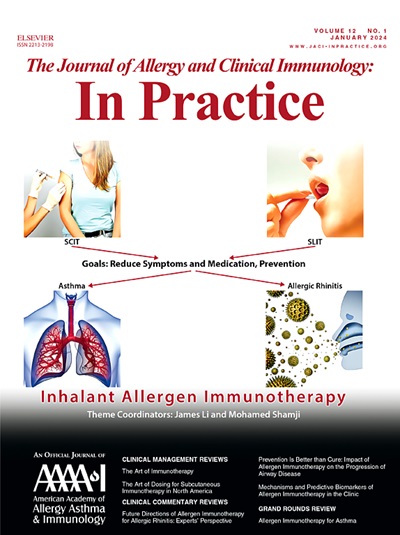Artificial Intelligence and Machine Learning for Inborn Errors of Immunity: Current State and Future Promise
IF 8.2
1区 医学
Q1 ALLERGY
Journal of Allergy and Clinical Immunology-In Practice
Pub Date : 2024-10-01
DOI:10.1016/j.jaip.2024.08.012
引用次数: 0
Abstract
Artificial intelligence (AI) and machine learning (ML) research within medicine has exponentially increased over the last decade, with studies showcasing the potential of AI/ML algorithms to improve clinical practice and outcomes. Ongoing research and efforts to develop AI-based models have expanded to aid in the identification of inborn errors of immunity (IEI). The use of larger electronic health record data sets, coupled with advances in phenotyping precision and enhancements in ML techniques, has the potential to significantly improve the early recognition of IEI, thereby increasing access to equitable care. In this review, we provide a comprehensive examination of AI/ML for IEI, covering the spectrum from data preprocessing for AI/ML analysis to current applications within immunology, and address the challenges associated with implementing clinical decision support systems to refine the diagnosis and management of IEI.
人工智能和机器学习治疗先天性免疫错误:现状与前景。
在过去十年中,医学领域的人工智能(AI)和机器学习(ML)研究呈指数级增长,这些研究展示了人工智能/ML 算法在改善临床实践和结果方面的潜力。开发基于人工智能的模型的持续研究和努力已扩展到帮助识别先天性免疫错误(IEI)。利用更大规模的电子健康记录(EHR)数据集,再加上表型精确度的提高和人工智能技术的增强,有可能显著改善先天性免疫错误的早期识别,从而增加获得公平护理的机会。在这篇综述中,我们全面探讨了用于 IEI 的人工智能/ML,涵盖了从人工智能/ML 分析的数据预处理到目前在免疫学中的应用,并探讨了与实施临床决策支持系统 (CDSS) 以完善 IEI 诊断和管理相关的挑战。
本文章由计算机程序翻译,如有差异,请以英文原文为准。
求助全文
约1分钟内获得全文
求助全文
来源期刊

Journal of Allergy and Clinical Immunology-In Practice
ALLERGYIMMUNOLOGY-IMMUNOLOGY
CiteScore
11.10
自引率
9.60%
发文量
683
审稿时长
50 days
期刊介绍:
JACI: In Practice is an official publication of the American Academy of Allergy, Asthma & Immunology (AAAAI). It is a companion title to The Journal of Allergy and Clinical Immunology, and it aims to provide timely clinical papers, case reports, and management recommendations to clinical allergists and other physicians dealing with allergic and immunologic diseases in their practice. The mission of JACI: In Practice is to offer valid and impactful information that supports evidence-based clinical decisions in the diagnosis and management of asthma, allergies, immunologic conditions, and related diseases.
This journal publishes articles on various conditions treated by allergist-immunologists, including food allergy, respiratory disorders (such as asthma, rhinitis, nasal polyps, sinusitis, cough, ABPA, and hypersensitivity pneumonitis), drug allergy, insect sting allergy, anaphylaxis, dermatologic disorders (such as atopic dermatitis, contact dermatitis, urticaria, angioedema, and HAE), immunodeficiency, autoinflammatory syndromes, eosinophilic disorders, and mast cell disorders.
The focus of the journal is on providing cutting-edge clinical information that practitioners can use in their everyday practice or to acquire new knowledge and skills for the benefit of their patients. However, mechanistic or translational studies without immediate or near future clinical relevance, as well as animal studies, are not within the scope of the journal.
 求助内容:
求助内容: 应助结果提醒方式:
应助结果提醒方式:


